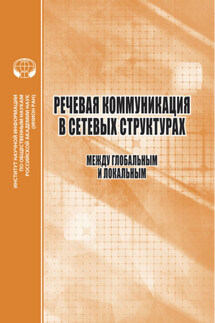Речевая коммуникация в сетевых структурах. Между глобальным и локальным - страница 12
Щурина Ю.В. Интернет-мемы как феномен интернет-коммуникации // Филология. – 2012. – № 3. – С. 160–172.
Эмоциональные и когнитивные нарушения в структуре наркологических заболеваний: взаимовлияние и взаимосвязь / Бузик О.Ж., Рычкова О.В., Агибалова Т.В., Гуревич Г.Л., Шалаева Е.В., Потапова Р.К. // Журнал неврологии и психиатрии им. С.С. Корсакова. – 2014. – № 5. – С. 79–83.
Юнг К. Конфликты детской души. – М.: Канон, 1997. – URL: https://cpp-p.ru/wp-content/uploads/2015/08/Karl_Gustav_YUng_Konfliktyi_detskoy_dushi.pdf (дата обращения: 07.07.2021).
Alterations of the amplitude of low-frequency fluctuations in treatment-resistent and treatment-responce depression: a resting-state fMRI study / Guo W., Liu F., Xue Z., Xu X., Wu R., Ma Ch., Wooderson S.C., Tan Ch., Sun X., Chen J., Liu Zh., Xiao Сh., Chen H., Zhao J. || Prog. Neuropsychopharmacol. Biol. Psychiatry. – 2012. – Vol. 37, N 1. – P. 153–160.
Berg E.A. A simple objective technique for measuring flexibility in thinking // The Journal of General Psychology. – 1948. – N 39(1). – P. 15–22.
Buckels E.E., Trapnell P.D., Paulhus D.L. Trolls just want to have fun // Personality and Individual Differences. – 2014. – N 67. – P. 97–102.
Clark L. Decision-making during gambling: an integration of cognitive and psychobiological approaches // Philosophical Transactions of the Royal Society B: Biological Sciences. – 2010. – N 365(1538). – P. 319–330.
Clark L. Disordered gambling: the evolving concept of behavioral addiction // Annals of the New York Academy of Sciences. – 2014. – N 1327(1). – P. 46–61.
Cruz A., Seo Yu. Trolling in online communities: A practice-based theoretical perspective // The information Society. – 2018. – N 34(1). – P. 15–26.
Deep learning for hate speech detection in tweets / Badjatiya P., Gupta S., Gupta M., Varma V. // Proceedings of the International Conference on World Wide Web (WWW). International World Wide Web Conferences Steering Committee. – 2017. – P. 759–760.
EEG investigation of brain bioelectrical activity (regarding perception of multimodal polycode Internet discourse) / Potapova R., Potapov V., Lebedeva N., Karimova E., Bobrov N. // Lectures Notes in Computer Science / A. Ali Salah, A. Karpov, R. Potapova (eds.). – 2019. – Vol. 11658. – P. 381–391.
Executive function abnormalities in pathological gamblers / Marazziti D., Catena Dell’Osso M., Conversano C., Consoli G., Vivarelli L., Mungai F., Di Nasso E., Golia F. // Clinical Practice and Epidemiology in Mental Health. – 2008. – N 4(1). – P. 1–6.
Fauth-Bühler M., Mann K., Potenza M.N. Pathological gambling: a review of the neurobiological evidence relevant for its classification as an addictive disorder // Addiction Biology. – 2016. – N 22(4). – P. 885–897.
Fortune E.E., Goodie A.S. Cognitive distortions as a component and treatment focus of pathological gambling: A review // Psychology of Addictive Behaviors. – 2012. – N 26(2). – P. 298–310.
Frank M.L., Lester D., Wexler A. Suicidal behavior among members of Gamblers Anonymous // Journal of Gambling Studies. – 1991. – N 7. – P. 249–254.
Goldstein R.Z., Volkow N.D. Dysfunction of the prefrontal cortex in addiction: neuroimaging findings and clinical implications // Nature Reviews Neuroscience. – 2011. – N 12(11). – P. 652–669.
Gordeev D., Potapov V. Toxicity in texts and images on the Internet // Lecture Notes in Computer Science / A. Karpov, R. Potapova (eds.). – 2020. – Vol. 12335. – P. 156–165.






